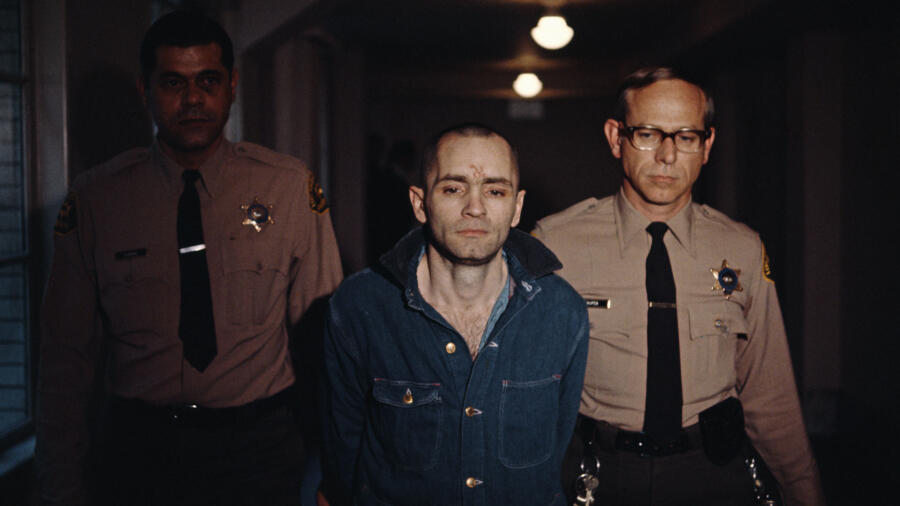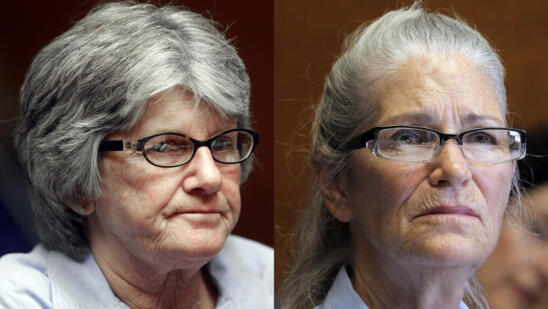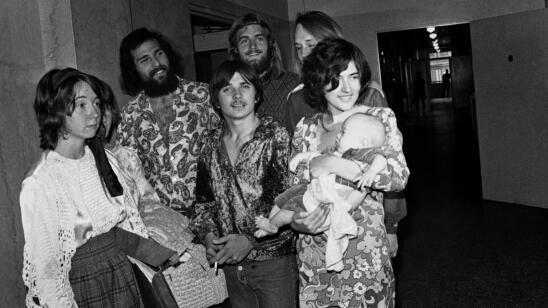Charles Manson may now be known as one of the biggest killers of the 20th century, but before he became a notorious cult leader who was convicted of masterminding nine murders, he had different ambitions, according to John E. Douglas, FBI profiler and author of the 1995 memoir, Mindhunter: Inside the FBI’s Elite Serial Crime Unit.
Douglas writes, “Charlie [Manson] hadn’t set out to be the dark guru. His goal was fame and fortune. He wanted to be a drummer and play for a famous rock band like the Beach Boys. He had been forced to live by his wits his entire life and so had become extremely adept at sizing up the people he met and quickly determining what they could do for him. He would have been excellent in my unit assessing an individual’s psychological strengths and weaknesses and strategizing how to get a killer we were hunting.”
A&E True Crime takes a closer look at what Douglas and others in the FBI had to say about the cult leader, who, with his followers, was convicted for seven murders—known as the Tate-LaBianca murders—on January 25, 1971. (Manson was convicted of two more murders afterwards.)
Would Manson have killed again?
In Mindhunter, Douglas notes that if Manson had been let out on parole, he wouldn’t expect him to kill again. In fact, in some ways, Douglas believed that Manson’s followers were more dangerous than Manson himself. “The biggest threat would be from the misguided losers who would gravitate to him and proclaim him their god and leader,” Douglas wrote.
But Dr. Bryanna Fox, a criminologist at the University of South Florida and a former FBI special agent, doesn’t fully agree with that assessment; she tells A&E True Crime she believes Manson would have been at high risk of killing again if he had ever been paroled (he died in prison in November 2017).
“While it is difficult to predict whether he would kill in the future, it is clear that his pathological traits and criminal tendencies would not disappear once released from prison,” she says. “These traits substantially increase the risk of criminality, whether it’s through fraud, drugs, violence or murder. Studies consistently suggests that the best predictor of future behavior is past behavior.”
Like many others who have studied Manson, Fox believes the late murderer was manipulative to the extreme, which was also part of his appeal. “Charm can be a very positive and useful talent, particularly for aspiring leaders, salespeople, celebrities, politicians,” Fox says.
Robert K. Ressler, who worked closely with Douglas in the FBI’s Behavioral Science Unit and wrote about Manson in his book, Whoever Fights Monsters: My Twenty Years Tracking Serial Killers for the FBI noted, “Manson is a great talker and his favorite subject is himself.”
Manson, however, famously used his charisma for evil, luring followers with his race-baiting talk of Helter Skelter and eventually convincing them to do his dirty work. As Douglas notes in his book, it does not appear Manson ever actually killed anyone by his own hand. But after the gruesome Tate-LaBianca murders, two prior slayings were also linked to Manson—Donald “Shorty” Shea and Gary Hinman, both of which were crimes Manson ordered his followers to commit for him.
“Manson’s innate ability to charm, con and manipulate others to get them to do almost anything, including kill for him, gave him the skills to build his cult-like ‘family’ and convince them to do horrific crimes,” says Fox.
Why did the Manson Family target Sharon Tate for their killing spree?
In Mindhunter, John he said he believed “Manson lost control of the situation and his followers”—that the choice of site and victims may have been random because “one of the Manson girls had been there and thought there was money around.”
Is it true, though, that the site was randomly chosen? From most of the facts and research that have been released about the crimes, Manson appeared to have explicitly set his sights on Sharon Tate’s house at Cielo Drive in L.A.—not to punish Tate or her husband, filmmaker Roman Polanski, but because it was the last known address of music producer Terry Melcher, who had once considered giving Manson a record deal but ultimately did not.
Manson was angry at Melcher for his role in the unraveling of his rock-star dreams, and it seems that the cult leader sought revenge. “When Manson ordered his followers to kill at that specific location, it does not appear to be random or for money,” affirms Fox. “Given the location of the murders and Manson’s anger towards Melcher, it appears the murders were premeditated. However, Sharon Tate and her friends were not Manson’s intended victims.”
How did Manson’s childhood trauma play into the Messianic manipulator he became?
It’s well-documented that Manson had a tough childhood. Though many, including Douglas claim that Manson’s mother, 16-year-old Kathleen Maddox, had been a prostitute, other experts balk at this notion, saying she was simply an unwed teen mother. (In 2017, Larry Brand of the podcast “Young Charlie,” told A&E True Crime that Manson actually lied about his mother being a prostitute in order to earn sympathy.) What was clear, though, was that his early years, fraught with bullying, run-ins with the law and abusive extended family members, were hard on Manson.
Although Fox never had the chance to interview Manson herself, she says she has extensively researched Manson’s childhood and conducted her own studies on the impact of childhood trauma on future offending and antisocial behavior. Based upon this information, she says she believes Manson’s childhood, which was marked by trauma, abuse and detachment from his mother had a “major impact” on how he behaved later in life.
“Manson craved adulation and power…which appears to have stemmed from his feelings of abandonment and powerlessness as a child when his mother sent him to live with relatives and at boy’s schools,” Fox asserts. “This evolved into a near-obsession for Manson, leading him to not only start his infamous ‘family’ of followers, but to push the limits to see what they would do for him.”
Of course, Manson’s quest for validation and control ended badly, not only for him and his victims, but for the followers he encouraged to kill in his name. Most of them are serving life in prison sentences or have died behind bars.
Related Features:
How to Talk to Serial Killers: An Interview with ‘Mindhunter’ John Douglas
Edmund Kemper: Why Would a Serial Killer Help the FBI Understand Other Serial Killers?
What Was Charles Manson’s Childhood Like?
What Was Charles Manson’s Life Like Before He Formed ‘The Family’ Cult?
What Drove the ‘Manson Girls’ to Murder?
Manson, Wuornos, Ramirez: 3 Famous Killers with Exceptionally Screwed-Up Childhoods



